#Julian Barbour
Explore tagged Tumblr posts
Text
Hence, although general relativity incorporates some elements of Mach's thinking, it does not subscribe to the completely relative conception of motion Mach advocated.²²
22. For balance, let me note that there are physicists and philosophers who do not agree with this conclusion. Even though Einstein gave up on Mach's principle, during the last thirty years it had taken on a life of its own. Various versions and interpretations is Mach's idea have been put forward, and, for example, some physicists have suggested that general relativity does fundamentally embrace Mach's ideas; it's just that some particular shapes that spacetime can have – such as the infinite flat spacetime of an empty universe – don't. Perhaps, they suggest, any spacetime that is remotely realistic – populated by stars and galaxies, and so forth – does satisfy Mach's principle. Others have offered reformulations of Mach's principle in which the issue is no longer how objects, such as rocks tied by a string or buckets filled with water, behave in an otherwise empty universe, but rather how the various time slicings – the various three-dimensional spatial geometries – relate to one another through time. An enlightening reference on modern thinking about these ideas is Mach's Principle: From Newton's Bucket to Quantum Gravity, Julian Barbour and Herbert Pfister, eds. (Berlin: Birkhäuser, 1995), which is a collection of essays on the subject. As an interesting aside, this reference contains a poll of roughly forty physicists and philosophers regarding their views on Mach's principle. Most (more than 90 percent) agreed that general relativity does not fully conform to Mach's ideas. Another excellent and extremely interesting discussion of these ideas, from a distinctly pro-Machian perspective and at a level suited to general readers, is Julian Barbour's book The End of Time: The Next Revolution in Physics (Oxford: Oxford University Press, 1999).
"The Fabric of the Cosmos" - Brian Greene
#book quotes#the fabric of the cosmos#brian greene#nonfiction#general relativity#ernst mach#motion#advocacy#mach's principle#julian barbour#herbert pfister#the end of time#physics#philosophy#albert einstein
2 notes
·
View notes
Text
youtube
TODAY IN PHILOSOPHY OF HISTORY
McTaggart on the A-Series, the B-Series, and the C-Series
It is the 158th anniversary of the birth of John McTaggart Ellis McTaggart (03 September 1866 – 18 January 1925), better known to posterity as J. M. E. McTaggart, who was born in London on this date in 1866. It is also the 103rd anniversary of the birth of Louis O. Mink (03 September 1921 – 19 January 1983), who was born in Ada, Ohio, on this date in 1921.
McTaggart denied the reality of time, so it would seem paradoxical to attribute to him a philosophy of history, but Mink, who was a philosopher of history, wrote a paper on McTaggart that was somewhat sympathetic, implying that a philosopher of history can appreciate the problems with time identified by McTaggart. To what extent are philosophies of history based on conceptions of time, and to what extent ought they to be so based? Must the nature of existence reflect the nature of time and history?
Quora: https://philosophyofhistory.quora.com/
Discord: https://discord.gg/r3dudQvGxD
Links: https://jnnielsen.carrd.co/
Newsletter: http://eepurl.com/dMh0_-/
Text post: https://geopolicraticus.substack.com/p/mctaggart-on-the-a-series-the-b-series
Video: https://youtu.be/Qtdm6TqSb7Q
Podcast: https://spotifyanchor-web.app.link/e/q2NxzIzXBMb
#youtube#philosophy of history#J. M. E. McTaggart#idealism#British idealism#personal idealism#supervenience#arrow of time#Julian Barbour#Plato#A-series#B-series#C-series#Louis O. Mink#time#naturalism
0 notes
Text



Worm-eating Viper aka Barbour's Short-headed Viper aka Uzungwe Mountain Bush Viper (Atheris barbouri), family Viperidae, endemic to the Uzungwe and Ukinga mountains of south-central Tanzania in Africa
Venomous.
The only member of the genus Atheris (Bush Vipers) that is fossorial (burrowing).
photographs by Julian Walt
255 notes
·
View notes
Text

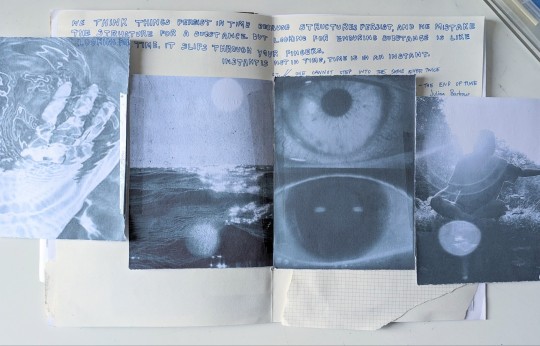
Quotes by Julian Barbour - The End of Time / photos are not mine
278 notes
·
View notes
Text
DID TIME OR SPACE EXIST FIRST??
Blog#450
Saturday, November 2nd, 2024.
Welcome back,
It’s the question that always comes up when thinking about the origin of the Universe: what came before the Big Bang?
And if there was no ‘before’, what was the cause of the Big Bang in the first place?
Until a few centuries ago, the answer was easy: some eternal deity set everything in motion.
Even Isaac Newton believed that God created the Universe, some 6,000 years ago.
Later, many scientists, including young Albert Einstein, assumed the Universe itself to be eternal and everlasting.
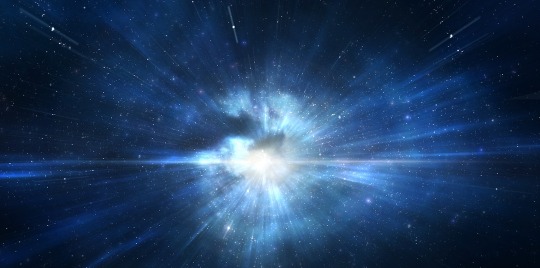
But when cosmic expansion was discovered, Belgian cosmologist (and Jesuit priest) Georges Lemaître realised there must have been a beginning – a scientific version of Genesis, so to speak.
Not that everyone immediately agreed.
Well into the 1960s, Fred Hoyle’s steady-state theory was quite popular among iconoclastic scientists as well as lay people.
Hoyle accepted the expansion of the Universe, but he didn’t believe in the Big Bang.
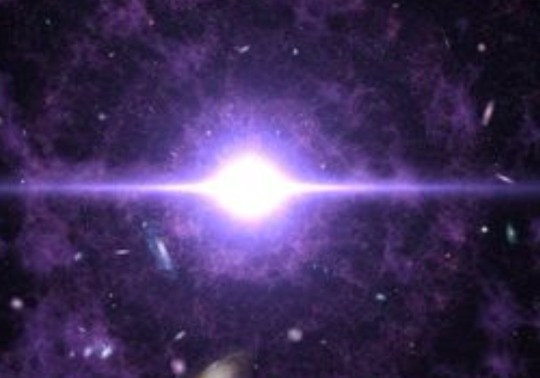
Instead, he assumed that a slow, continuous creation of new matter could keep the average density and the general properties of the Universe constant over time.
The 1964 discovery of the cosmic microwave background was the major nail in the coffin of the steady-state theory.
Ever since, supporting evidence for the Big Bang origin of our Universe has accumulated to a point where there’s hardly any doubt left.
Still, no one has the final answer to the question "what happened before the Big Bang?".

Could there have been a Universe before the Big Bang?
Most scientists simply ignore the question, as it seems to be too hard a nut to crack.
When astronomers talk about the Big Bang, they usually do not refer to the very beginning of the Universe (time zero), but to the incredibly hot and compact state of the Universe in the first couple of minutes of its existence.

To some extent, this is because no one has a real clue about the true nature of time, let alone about the beginning of time.
British physicist Julian Barbour, for one, has argued that time doesn’t even exist, except as an illusion in our minds.
According to others (including Stephen Hawking), time came into existence together with the Universe, rendering the whole concept of the word ‘before’ meaningless.
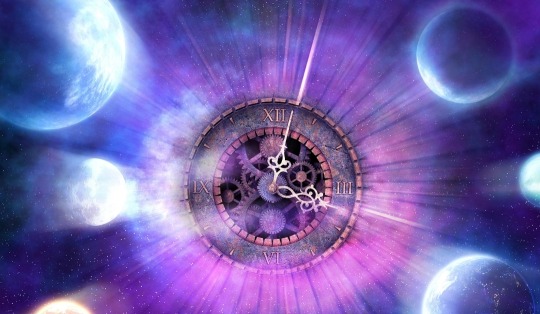
Asking what happened before the Big Bang would be like asking what lies north of the North Pole, or what distance is shorter than zero.
Then again, we simply don’t know whether or not there was time before the Big Bang.
According to the once-popular idea of the cyclic (or oscillatory) Universe, the current expansion of space could one day revert into a contraction, and the resulting Big Crunch could bounce into a new Big Bang, starting the next cycle of an eternal sequence.
It’s just one of many hypotheses in which our Universe is not unique, but part of a possibly infinite multiverse, one way or another.
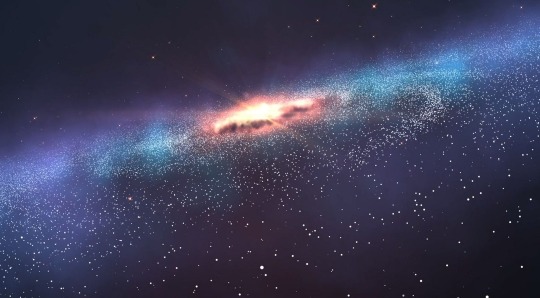
And if the multiverse is also infinite in time, we’re back to the idea that everything has existed forever, conveniently circumnavigating the nagging question of a beginning.
Finally, South African physicist Neil Turok thinks the Big Bang not only spawned our Universe, but also an anti-Universe, composed of antimatter and running backward in time.
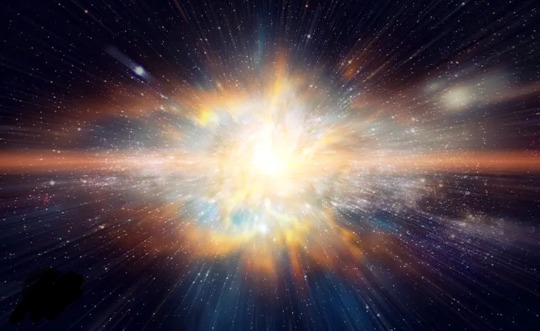
Again, an intriguing idea, but there’s also no chance of confirmation (or rejection!) via observations.
In the end, we have to admit we’re ignorant about the true beginning of the Universe.
And even if we lean towards an eternal multiverse with no real beginning at all, we don’t know why there is something (or, more to the point, why there is everything) instead of nothing.
Originally published on https://www.skyatnightmagazine.com
COMING UP!!
(Wednesday, November 6th, 2024)
"Astrophysics vs. Astronomy: What's the Difference??"
#astronomy#outer space#alternate universe#astrophysics#universe#spacecraft#white universe#space#parallel universe#astrophotography
58 notes
·
View notes
Text
5 notes
·
View notes
Text
Julian Barbour would completely agree.
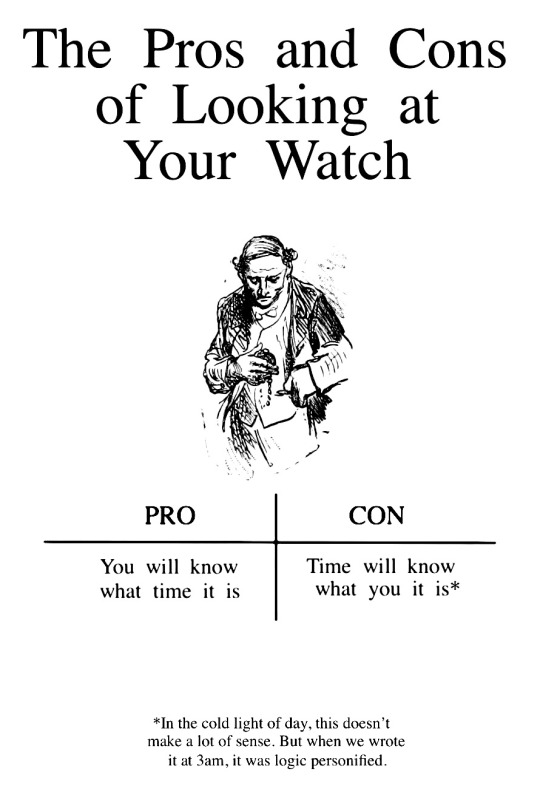
40K notes
·
View notes
Text

What came before the Big Bang? (September 2024)
These are the Best Theories we have about the Origin of the Cosmos
BBC Sky at Night Magazine (article): https://www.skyatnightmagazine.com/space-science/what-was-before-big-bang
We Explore the Theories about one of the most mind-boggling questions our Human Species have about the Universe.
It’s the question that always comes up when thinking about the origin of the Universe: what came before the Big Bang?
And if there was no ‘before’, what was the cause of the Big Bang in the first place?
Until a few centuries ago, the answer was easy: some eternal deity set everything in motion.
Even Isaac Newton believed that God created the Universe, some 6,000 years ago.
Later, many scientists, including young Albert Einstein, assumed the Universe itself to be eternal and everlasting.
The Beginning of the Universe
But when cosmic expansion was discovered, Belgian cosmologist (and Jesuit priest) Georges Lemaître realised there must have been a beginning – a scientific version of Genesis, so to speak.
Not that everyone immediately agreed.
Well into the 1960s, Fred Hoyle’s steady-state theory was quite popular among iconoclastic scientists as well as lay people.
Hoyle accepted the expansion of the Universe, but he didn’t believe in the Big Bang.
Instead, he assumed that a slow, continuous creation of new matter could keep the average density and the general properties of the Universe constant over time.
The 1964 discovery of the cosmic microwave background was the major nail in the coffin of the steady-state theory.
Ever since, supporting evidence for the Big Bang origin of our Universe has accumulated to a point where there’s hardly any doubt left.
Still, no one has the final answer to the question "what happened before the Big Bang?".
Could there have been a Universe before the Big Bang?
Most scientists simply ignore the question, as it seems to be too hard a nut to crack.
The Beginning of Time
When astronomers talk about the Big Bang, they usually do not refer to the very beginning of the Universe (time zero), but to the incredibly hot and compact state of the Universe in the first couple of minutes of its existence.
To some extent, this is because no one has a real clue about the true nature of time, let alone about the beginning of time.
British physicist Julian Barbour, for one, has argued that time doesn’t even exist, except as an illusion in our minds.
According to others (including Stephen Hawking), time came into existence together with the Universe, rendering the whole concept of the word ‘before’ meaningless.
Asking what happened before the Big Bang would be like asking what lies north of the North Pole, or what distance is shorter than zero.
Alternative Theories
Then again, we simply don’t know whether or not there was time before the Big Bang.
According to the once-popular idea of the cyclic (or oscillatory) Universe, the current expansion of space could one day revert into a contraction, and the resulting Big Crunch could bounce into a new Big Bang, starting the next cycle of an eternal sequence.
For more on this, read our interview with Katie Mack about the end of the Universe.
It’s just one of many hypotheses in which our Universe is not unique, but part of a possibly infinite multiverse, one way or another.
And if the multiverse is also infinite in time, we’re back to the idea that everything has existed forever, conveniently circumnavigating the nagging question of a beginning.
Finally, South African physicist Neil Turok thinks the Big Bang not only spawned our Universe, but also an anti-Universe, composed of antimatter and running backward in time.
Again, an intriguing idea, but there’s also no chance of confirmation (or rejection!) via observations.
In the end, we have to admit we’re ignorant about the true beginning of the Universe.
And even if we lean towards an eternal multiverse with no real beginning at all, we don’t know why there is something (or, more to the point, why there is everything) instead of nothing.
This article originally appeared in the June 2023 issue of BBC Sky at Night Magazine.
0 notes
Text
Time Reborn by Lee Smolin
PART 1: arguments for a timeless universe
newton's paradigm
deterministic. everything is predictable. we should be able to measure where the ball lands, given its initial position, velocity, and momentum based on the density of the air (the means), etc.
but of course this doesn't simply apply to the entire universe, which is entangled of causal processes which occur over time.
einstein's relativity
there is no absolute, universal time. time is a perceived relationship.
also no way to really tell which two events happened simultaneously, if far away enough
because there is no real "now" and no reference to the time now.. no meaning to past, present, and future. only causal structure (all just relationships between events), a timeless system of cause and effect between events. this is called block universe
quantum mechanics
also deterministic, like newton's laws, just different in that it calculates the probability of the end state, rather than the position, over time.
time is taken out of the equation again, and when this theory is applied to the whole universe, the state of universe already just is. It's frozen. and that there is zero energy and oscillation inside this universe in isolation, with the clock + observer placed outside the universe.
the modified schroedinger equation in frozen state is the famous de-witt wheeler equation. the disappearance of time is still a large topic of argument in this field.
philosopher julian barbour took this theory to heart and asserted that we're just living in a heap of moments (already defined and frozen) and that we're just experiencing them - probabilistically. there are moments that occur multiple times (based on probability of a quantum state) on relative frequency.
Einstein did apparently have trouble accepting his own grand conclusions in the end. He mentions that the Now is truly a precious human experience, and that it must be outside of the scientific realm to explain that phenomenon. well 🤷🏻♀️ it is probably as basic as just bringing back time into the equation of physics, and that is the entire argument Lee is making and supporting in the second part of his book.
PART 2: coming soon
0 notes
Text
The Enduring Romances of Bachelor Nation: Couples Still Going Strong

The Bachelor franchise, having its inception in 2002, is renowned for making love connections that sometimes span years. While there have been numerous breakups, the story isn't entirely gloomy. Several couples have flourished, proving that love can indeed be found on reality television. In this article, we delve into the ongoing romances in Bachelor Nation, demonstrating the franchise's successful matchmaking prowess.
The Original Success: Trista Rehn and Ryan Sutter
This romance is the benchmark for all Bachelor Nation couples. Trista Rehn and Ryan Sutter, who found love during The Bachelorette's first season in 2003, are the longest-married couple in Bachelor history, having recently celebrated 19 years of marriage in December 2022. Their enduring love story remains an inspiring testament to the franchise's potential to forge lasting relationships.
Love After Paradise: Strong Couples from Bachelor in Paradise
Bachelor in Paradise is renowned for forming successful relationships, with numerous couples still going strong. Among them, Michael Allio and Danielle Maltby are currently dating after meeting on the show's eighth season. Season seven proved exceptionally fruitful, producing three engaged couples: Zach Shallcross and Kaity Biggar, Kenny Braasch and Mari Pepin, and Thomas Jacobs and Becca Kufrin. Despite a temporary breakup while filming in 2021, Noah Erb and Abigail Heringer reconciled and are now cautiously navigating their relationship.

Overcoming Hurdles: Matt James and Rachael Kirkconnell
The Bachelor season 25's Matt James and Rachael Kirkconnell provide an example of overcoming hurdles for love. Despite breaking up while the show was airing in early 2021, they managed to mend their relationship and are now happily dating.
Successful Engagements: Dylan Barbour and Hannah Godwin, and Dean Unglert and Caelynn Miller-Keyes
The sixth season of Bachelor in Paradise produced two solid engagements that continue to flourish. Dylan Barbour and Hannah Godwin, along with Dean Unglert and Caelynn Miller-Keyes, are testament to the success of this show's format.
Bachelor Nation's Family Men and Women
Numerous Bachelor Nation couples have moved beyond just marriage and started families. Some of these couples include Arie Luyendyk Jr. and Lauren Burnham, Kevin Wendt and Astrid Loch, Raven Gates and Adam Gottschalk, Jade Roper and Tanner Tolbert, and Sean Lowe and Catherine Giudici, all of whom are now proud parents.
Time-Tested Love: The Longest Married Couples
Lastly, the franchise has seen a number of couples sustain their love for many years. Some of these long-married couples include Rachel Lindsay and Bryan Abasolo, Jordan Rodgers and JoJo Fletcher, Jared Haibon and Ashley Iaconetti, Chris Siegfried and Desiree Hartsock, Jason Mesnick and Molly Malaney, Holly Durst and Blake Julian, and of course, Trista Rehn and Ryan Sutter. From initial courtship to engagements and marriages that have endured years, these Bachelor Nation love stories underscore the franchise's potential to make lasting connections. While there may be bumps along the way, these couples prove that finding enduring love on reality television is indeed possible. Read the full article
0 notes
Photo

Se non accadesse nulla, se nulla cambiasse, il tempo si fermerebbe. Perché il tempo non è altro che cambiamento, ed è appunto il cambiamento che noi percepiamo, non il tempo. Di fatto il tempo non esiste.
Julian Barbour, da La fine del tempo
38 notes
·
View notes
Text
Life is the flight of a sparrow
There are nows, says Julian Barbour, there are various nows and all those nows exist simultaneously, as different possibilities. And that’s all. No one and nothing travels from one now into the next now. We pass, but time does not.
Life is the flight of a sparrow that flutters in through one window and flies out another.
— Semezdin Mehmedinovic, My Heart: A Novel. Celia Hawkesworth (Translator). (Catapult, March 9, 2021)
7 notes
·
View notes
Quote
Developing the 'Platonic' theme, I conjecture that the actual universe in which we find ourselves corresponds to some Platonia. We have not yet fully grasped the structure of its points, its Nows. Perhaps we never shall, but I assume that in any instant what we experience, including the appearance of motion, is a transmuted representation of a part of one such Now. This is not far removed from Plato's original idea that we mortals are like beings confined from birth to a cave, and that all we ever comprehend of the outside world and the real beings in it are the shadows they cast on the wall of our cave as they pass its entrance. I also think that Plato was right when he said that Being (one of his forms, one of my instants of time) is real, but that Becoming is an illusion. However, I go further than Plato in attributing the illusion of Becoming to something that is real – a special time-capsule structure of Nows. The illusion of Becoming has its basis in real structure in special Being.
Julian Barbour, The End of Time: The Next Revolution in Physics
#quote#Julian Barbour#physics#science#Plato#Platonia#time#The End of Time#Barbour#universe#reality#philosophy#Allegory of the Cave#being
32 notes
·
View notes
Text

Title: The Janus Point | Author: Julian Barbour | Publisher: Vintage (2020)
0 notes